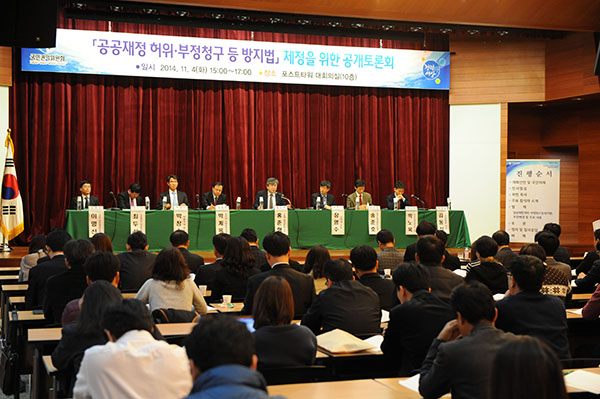News & Publications
Press Release
Government subsidy & grant fraud will lead to maximum 5-fold redemption of illicit benefits
- Date2015-01-08
- Hit2,539

November 4, 2014
The ACRC holds a discussion forum to enact the Bill on the Prevention of False Claims of Public Funds
The ACRC is seeking to legislate a bill to redeem fraudulently claimed public funds such as government subsidies, financial grants, and R&D funds, and in addition to redemption, to impose punitive additional penalties amounting to as much as five times the redemption money.
On November 4, to prepare for the enactment of the Act on the Prevention of False Claims of Public Funds, the Commission held an open discussion forum at Post Tower in Seoul.
The panel of the discussion forum represented various sectors including government, academia, and civil society—Professor Young-soo Chang of Korea University, Professor Jhungsoo Park of Ewha Womans University, Professor Jun-ho Song, co-representative of Heungsadahn Transparency Movement, and Director No-wook Park of the Korea Institute of Public Finance as well as the officials from the ACRC, the Ministry of Strategy and Finance and the Ministry of Government Administration and Home Affairs.
ACRC Chairman Sungbo Lee said in his opening remarks, "The growing amount of budget for government subsidies, grants, and research funds has contributed to increasing false and fraudulent claims. It is urgent to establish a system to fundamentally solve this problem."
Chairman Lee also mentioned, "The ACRC opened the Government Welfare Fraud Report Center in October last year. The center exposed falsely paid subsidies of KRW 33 billion, but some of them could not be redeemed and intentional or habitual false claims were also lightly punished due to the lack of legal grounds."
Director General Gae-ok Park of the Anti-Corruption Bureau of the ACRC pointed out in his presentation that at present, it is very inefficient to redeem fraudulently paid subsidies and grants because numerous laws should be amended individually to add redemption-related provisions or a legal ground for redemption should be created every time the government kicks off a new project.
To solve such problems, the Bill on the Prevention of False Claims of Public Funds includes the provisions to establish legal grounds to redeem all the amounts of unduly paid benefits even if an individual law does not stipulate the legal grounds for redemption or collection procedures. In addition to redemption, the Bill imposes additional penalties or punitive damages as much as up to 5 times the illicit gains, in the cases of excessive appropriation, submission of false s, use of subsidies/grants for other purposes, and habitual fraudulent claims.
Furthermore, the ACRC is planning to exempt additional penalties if a claimant voluntarily reports the false claim and pays back all the amount of the falsely claimed benefits. Additional penalties will not be imposed in the case that the false claim is less than KRW 1 million or is a welfare benefit provided as a minimum social safety net program.
In addition, the Bill includes the provision to debar false claimants from business projects or programs contracted from public organizations up to 2 years if the imposition of the additional penalty is confirmed, and to disclose the list of habitual violators to the public.
Moreover, reward money up to KRW 2 billion will be paid to the reporting person. The amount of reward money will be calculated by adding the illicit benefit and additional penalty.
The experts who participated in the discussion forum generally expressed sympathy with the purpose of the enactment of the Bill, considering the serious loss of national finance caused by false and fraudulent claims.
Professor Young-soo Chang of Korea University Law School said that to eradicate the acts damaging public finance, it is not enough to simply redeem undue benefits, but additional sanctions such as additional penalty and punitive damage will be effective to prevent such acts.
Professor Jhungsoo Park of Ewha Womans University strongly agreed with the purpose to put in place strict legal mechanisms to redeem the loss of public finance, and insisted that it is necessary to provide appropriate incentives for whistleblowers as well as to increase the stringency of punishment.
Professor Jun-ho Song, a co-representative of Heungsadahn Transparency Movement, agreed on the enactment of the Bill, pointing out that there had been negligence in establishing systems to prevent the occurrence of subsidy-related corruption cases. Professor Song also urged to further increase the amount of additional penalties, which is currently stipulated as a maximum of 5-fold in the draft bill.
No-wook Park, Director of the Center for Performance Evaluation & Management of the Korea Institute of Public Finance, suggested that it is also necessary to secure the administrative infrastructure such as human resources to collect additional penalties because the existing punitive measures on false claims have not been strong enough so far, making the risk burden of false claimants very low.
The ACRC is planning to review the various opinions collected in this discussion forum, and to submit the final draft of the Bill to the National Assembly in April next year.









